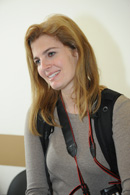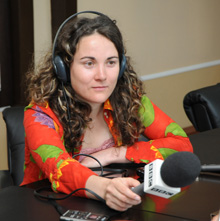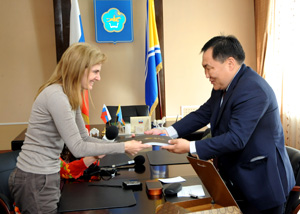 Michelle Feynman, whose father was Richard Feynman (1918-1988), laureate of Nobel Prize for physics, and one of the participants in the atom bomb project, came to Tuva on June 8. Michelle Feynman, whose father was Richard Feynman (1918-1988), laureate of Nobel Prize for physics, and one of the participants in the atom bomb project, came to Tuva on June 8.
She is accompanied by Ilona Vinogradova, a BBC correspondent. This visit is expected to result in a radio program about the dream of the scientist – to visit the republic in the center of Asia, which Feynman had been trying to visit for almost 20 years. 
Feynman and his friend, mathematics teacher Ralph Leighton, who were both passionate admirers of Tva, bombarded Intourist and The Academy of Sciences with petitions; they sent letters to Tuvan addresses found in ecyclopedias; they wrote messages with the help of a Tuvan-Mongolian-Russian phrase book and a Russian-English dictionary; they attacked Moscow radio, which broadcast in English, with a single plea: “Help us get to Tuva.”.
They received formal responses, but without an answer to their main question.
The two friends founded the organization “Friends of Tuva in America”, they observed Tuvan national holidays, and performed virtual travels through the streets of Kyzyl or Chadan.
Feynman never managed to get to Tuva. He died in 1988. Instead of him, the trip was realized by his daughter Michelle.
During this visit, Michelle Feynman met with throat singers, and with relatives of the famous folklorist Ondar Kishchalaevich Darymaa (he became the first Tuvan whom the two friends contacted, when they found his address in a scientific publication after a long search in various libraries).

On June 10, Michelle Feynman met with the head of the republic, Sholban Kara-ool. During the BBC interview, the Tuvan Premier answered questions on the subject of why Tuva is so attractive to hundreds of foreigners, and how to utilize the energy and potential of the people, who are “obsessed” with Tuva like Feynman, for the good of the republic and for its development.
All the adventures that the two American fans of Tuva met during their desperate attempts to visit the center of Asia are described in Ralph Leighton’s book
“Tuva or Bust”.
This is the first chapter of that famous book.
There Is No Such Country
The plates were being cleared from the table, and I had just begun finishing off the salad – part of what had become a weekly ritual at the Feynmans’. Richard, always at the north end of the grand table, traded witticisms with his son Carl, who shared the lengthy east side of the table with the guest. To the south sat Gweneth, making sure the food moved smoothly around the table, and daughter Michelle occupied the west.
It was late summer of 1977. Michelle was about to enter the second grade at a local elementary school; Carl was ready to begin his junior year at the high school in Pasadena where I would be teaching mathematics and coaching water polo.
“Math is okay,” I said, “but what I really is geography. If I had a geography class I would bring in my shortwave radio and tune in the BBC or Radio Netherland. We’d play geography games like I did with my brother: he and I would go through every independent country of the world. You know, the last letter of Liechtenstein determines the first letter of the next country – Nepal, for example.”
“Or Nigeria, Niger, or Nicaragua,” said Carl, with a hint of his mother’s Yorkshire accent.
“And after exhausting the independent countries,” I continued, “we would move on to provinces. Did you know there’s a province called ‘Amazonas’ in three different countries?”
“Let’s see,” said Carl. How about Brazil, Colombia, and Peru?”
“Not bad,” I replied. “The third country is Venezuela, although Peru does have more of the Amazon in it than Venezuela does.”
“So you think you know every country in the world?” interjected Richard in a familiar, mischievous voice, that usually signaled impending doom for its target.
“Uh, sure,” I said, taking another bite of salad, preparing myself for the embarrassment that was sure to follow.
“Okay, then what ever happened to Tannu Tuva?”
“Tannu what?” I said. ”I never heard of it.”
“When I was a kid,” Richard continued, “I used to collect stamps. There were some wonderful triangular and diamond-shaped stamps that came from a place called ‘Tannu Tuva’.”
I became suspicious my brother Alan, a stamp collector, had made a fool out of me dozens of times when we played “Islands of the World.” He would rattle off some exotic-sounding name like “Aitutaki”, and when I challenged him on it he would pull out his stamp catalog and show me a few stamps from that place. So I stopped challenging him, and he grew bolder and bolder, winning game after game. Finally I caught him on “Aknaki”, supposedly part of a tiny atoll in the South Pacific, after dimly recalling that the week before he had claimed it was a river in Mauritania. So I straightened up in my chair a bit and said, “Sir, there is no such country.”
“Sure there is,” said Richard. “In the 1930’s it was a purple splotch on the map near Outer Mongolia, and I’ve never heard anything about it ever since.”
Had I stopped and thought a moment, I would have realized that Richard’s favorite trick was to say something unbelievable that turns out to be true. Instead, I tightened the noose that had just been placed around my neck: “The only countries near outer Mongolia are China and the Soviet Union,” I said, boldly. “I can show you on the map.”
I grabbed my last bite of salad as we got up from the table and proceeded into the living room to Richard’s favorite book, the
Encyclopaedia Britannica. In the last volume there was an atlas. We opened it to a map of Asia.
“See?” I said. “There’s nothing here but the USSR, Mongolia, and China. This ‘Tannu Tuva’ must have been somewhere else.”
“Oh, look!” said Carl. “Tuvinskaya ASSR. It’s bordered on the south by the Tannu-Ola Mountains.”
Sure enough, occupying a notch northwest of Mongolia was a territory that could well once have had the name Tannu Tuva. I thought, I’ve been had by a stamp collector again!
“Look at this,” remarked Richard. “The capital is spelled K-Y-Z-Y-L.”
“That’s crazy,” I said. ”There’s not a legitimate vowel anywhere!”
“We must go there,” said Gweneth.
“Yeah!” exclaimed Richard. ”A place that’s spelled K-Y-Z-Y-L has just got to be interesting!”
Richard and I grinned at each other and shook hands
Everyone returned to the dining room for tea and dessert.
As the conversation continued, I thought of the classic question, “Why are you climbing that mountain?” Our “mountain” had no particular physical challenge to it, but reaching a place controlled by the USSR in the deepest interior of Asia was sure to be difficult. And our reason for undertaking the challenge was downright profound compared to the classic answer: “Because it’s spelled K-Y-Z-Y-L!”
We discussed how we might reach our goal. Of course Richard could give a series of physics lectures in Moscow, and we could all go to Kyzyl afterwards.(Actually, anyone traveling under such circumstances should insist on going to Tuva
first, in case some sort of “difficulty” arose after the lectures.) But reaching tuva that way would be like riding in a helicopter to the summit.
Richard had journeyed to remote corners of the world before. Gweneth recounted how, a few years before, they had trekked for two weeks on foot with a friend and a Mexican graduate student into a mountainous region of northwest Mexico. They descended into a canyon, the Barranca de Cobre – said to be longer and deeper that the Grand Canyon – and met Tarahumara Indians who had had very little contact with the outside world. Ricgard had borrowed a Tarahumara-Spanish dictionary from UCLA and learned some phrases from it, but when he spoke to them in their native language, the Indians suspected he was a Mexican government official! After convincing them otherwise, Richard was offered the local intoxicating brew by the Tarahumara as a gesture of honor. (Richard normally did not touch alcohol, but made an exception in this case.) Gweneth and Richard enjoyed the adventure so much that they returned to the region a year later.
After dinner Richard and I continued the weekly ritual, going downstairs to drum in his studio. Although we had been drumming together for ten years by now, that “primitive” activity still had not lost any of its power.
During one of our breaks Richard went to the book case, which was filled to the brim with books, technical papers, exotic rhythm instruments, and artist’s sketch pads. Soon he pulled out an old, slim book and opened it. It was an atlas from 1943. And there, on the map of Asia, next to Outer Mongolia, was that purple splotch called Tannu Tuva.
|
